The 2018 FIFA World Cup will be the 21st FIFA World Cup, a quadrennial international football tournament contested by the men's national teams of the member associations of FIFA. It is scheduled to take place in Russia from 14 June to 15 July 2018,[2] after the country was awarded the hosting rights on 2 December 2010. This will be the first World Cup held in Europe since the 2006 tournamentin Germany; all but one of the stadium venues are in European Russia, west of the Ural Mountains, to keep travel time manageable.
The final tournament will involve 32 national teams, which include 31 teams determined through qualifying competitions and the automatically qualified host team. Of the 32 teams, 20 will be making back-to-back appearances following the last tournament in 2014, including defending champions Germany, while Iceland and Panama will both be making their first appearances at a FIFA World Cup. A total of 64 matches will be played in 12 venues located in 11 cities. The final will take place on 15 July at the Luzhniki Stadium in Moscow.[3][4][5]
The winners of the World Cup will qualify for the 2021 FIFA Confederations Cup.
Host selection
The bidding procedure to host the 2018 and 2022 FIFA World Cups began in January 2009, and national associations had until 2 February 2009 to register their interest.[6] Initially, nine countries placed bids for the 2018 FIFA World Cup, but Mexico later withdrew from proceedings,[7] and Indonesia's bid was rejected by FIFA in February 2010 after the Indonesian government failed to submit a letter to support the bid.[8] During the bidding process, the three remaining non-UEFA nations (Australia, Japan, and the United States) gradually withdrew from the 2018 bids, and the UEFA nations were thus ruled out of the 2022 bid. As such, there were eventually four bids for the 2018 FIFA World Cup, two of which were joint bids: England, Russia, Netherlands/Belgium, and Portugal/Spain.
The twenty-two-member FIFA Executive Committee convened in Zürich on 2 December 2010 to vote to select the hosts of both tournaments.[9] Russia won the right to be the 2018 host in the second round of voting. The Portugal/Spain bid came second, and that from Belgium/Netherlands third. England's bid to host its second tournament fell at the first hurdle.[10]
The voting results were as follows:[11]
| Bidders | Votes | |
|---|---|---|
| Round 1 | Round 2 | |
| Russia | 9 | 13 |
| Portugal / Spain | 7 | 7 |
| Belgium / Netherlands | 4 | 2 |
| England | 2 | Eliminated |
The process was not without criticism: allegations of bribery on the part of the Russian team and corruption from FIFA members were made particularly by the English Football Association. It was alleged that four members of the executive committee had requested bribes to vote for England, and Sepp Blatter said that it had already been arranged before the vote that Russia would win.[12] Although the 2014 Garcia Report absolved Russia of any blame, the FA refused to accept this, with Greg Dyke calling for a re-examination of the affair and David Bernstein calling for a boycott of the World Cup.[citation needed][needs update]
Teams
Qualification
For the first time in the history of the FIFA World Cup, all eligible nations – the 209 FIFA member associations minus automatically qualified hosts Russia – entered the qualifying process.[13] Zimbabwe and Indonesia were later disqualified before playing their first matches,[14][15] while Gibraltar and Kosovo, who joined FIFA on 13 May 2016 after the qualifying draw but before European qualifying had begun, also entered the competition.[16] Places in the tournament were allocated to continental confederations, with the allocation unchanged from the 2014 World Cup.[17][18] The first qualification game began in Dili, Timor Leste, on 12 March 2015 as part of the AFC's qualification,[19] and the main qualifying draw took place at the Konstantinovsky Palace in Strelna, Saint Petersburg on 25 July 2015 at 18:00 local time (UTC+3).[20][21][22][2]
Of the thirty-two nations qualified to play at the 2018 FIFA World Cup, twenty countries competed at the previous edition of the tournament in 2014. Both Iceland and Panama qualified for the first time, with the former becoming the smallest country in terms of population to reach the World Cup.[23] Other teams returning after absences of at least three tournaments include: Egypt, returning to the finals after a 28-year absence from their last appearance in 1990; Morocco, who last competed in 1998; Peru, returning after a 36-year absence (since 1982); and Senegal, competing for the second time after reaching the quarter-finals in 2002. It is the first time three Nordic countries (Denmark, Iceland and Sweden) and four Arab nations (Egypt, Morocco, Saudi Arabia and Tunisia) have qualified for the World Cup.[24]
Notable countries that failed to qualify include four-time champions Italy (for the first time since 1958) and three-time runner-up Netherlands. Four reigning continental champions failed to qualify: 2017 Africa Cup of Nations winner Cameroon, two-time Copa América champion and 2017 Confederations Cup runner-up Chile, 2016 OFC Nations Cup winner New Zealand, and 2017 CONCACAF Gold Cup champion United States (for the first time since 1986). The other notable qualifying streaks broken were for Ghana and Ivory Coast, who had both made the previous three tournaments.
Draw
The draw was held on 1 December 2017, at 18:00 MSK, at the State Kremlin Palace in Moscow.[25][26] The 32 teams were drawn into eight groups of four.
For the draw, the teams were allocated to four pots based on the FIFA World Rankings of October 2017. Pot 1 contained the hosts Russia (who were automatically assigned to Position A1) and the best seven teams, Pot 2 contained the next best eight teams, and so on for Pots 3 and 4.[27] This was different from previous draws, where only Pot 1 was based on FIFA Rankings while the remaining pots were based on geographical considerations. However, still retained was the fact that teams from the same confederation were not drawn against each other for the group stage, except for UEFA where each group contained up to two teams.
| Pot 1 | Pot 2 | Pot 3 | Pot 4 |
|---|---|---|---|
Squads
Each team must first name a preliminary squad of 30 players. From the preliminary squad, the team must name a final squad of 23 players (three of whom must be goalkeepers) by the FIFA deadline. Players in the final squad may be replaced due to serious injury up to 24 hours prior to kickoff of the team's first match, where the replacement players do not need to be in the preliminary squad.[28]
For players named in the 30-player preliminary squad, there is a mandatory rest period between 21 and 27 May 2018, except for those involved in the 2018 UEFA Champions League Final played on 26 May.[29]
In February 2018, it was announced that the number of players to be named in the provisional squads would be increased from 30 to 35.[30]
Referees
On 16 March 2018, the FIFA Council approved the use of video assistant referees (VAR) for the first time in a FIFA World Cup tournament.[31]
On 29 March 2018, FIFA released the list of 36 referees and 63 assistant referees selected to oversee matches.[32]
| [show]List of officials |
|---|
Venues
| Wikimedia Commons has media related to Stadiums of FIFA World Cup 2018. |
Russia proposed the following host cities: Kaliningrad, Kazan, Krasnodar, Moscow, Nizhny Novgorod, Rostov-on-Don, Saint Petersburg, Samara, Saransk, Sochi, Volgograd, Yaroslavl, and Yekaterinburg.[33] All the cities are in or just outside European Russia to reduce travel time for the teams in the huge country. The bid evaluation report stated: "The Russian bid proposes 13 host cities and 16 stadiums, thus exceeding FIFA's minimum requirement. Three of the 16 stadiums would be renovated, and 13 would be newly constructed."[34]
In October 2011, Russia decreased the number of stadiums from 16 to 14. Construction of the proposed Podolsk stadium in the Moscow region was cancelled by the regional government, and also in the capital, Otkrytiye Arena was competing with Dynamo Stadium over which would be constructed first.[35]
The final choice of host cities was announced on 29 September 2012. The number of cities was further reduced to 11 and number of stadiums to 12 as Krasnodar and Yaroslavl were dropped from the final list.[36]
Sepp Blatter stated in July 2014 that due to concerns over the completion of venues in Russia, the number of venues for the tournament may be reduced from 12 to 10. He also said, "We are not going to be in a situation, as is the case of one, two or even three stadiums in South Africa, where it is a problem of what you do with these stadiums".[37]
In October 2014, on their first official visit to Russia, FIFA's inspection committee and its head Chris Unger visited St Petersburg, Sochi, Kazan and both Moscow venues. They were satisfied with the progress.[38]
On 8 October 2015, FIFA and the Local Organising Committee agreed on the official names of the stadiums used during the tournament.[39]
Of the 12 venues used, the Luzhniki Stadium in Moscow and the Saint Petersburg Stadium (the two largest stadiums in Russia) will be used most, with 7 matches being played at each of these stadiums. Sochi, Kazan, Nizhny Novogrod and Samara will host 6 matches including one quarter-final match apiece, and the Otkrytiye Stadium in Moscow and Rostov-on-Don will host 5 matches apiece including one round of 16 match each. Volgograd, Kaliningrad, Yekaterinburg and Saransk will host 4 matches each and none of these cities will host any knockout stage games.
| Moscow | Saint Petersburg | Kaliningrad | |
|---|---|---|---|
| Luzhniki Stadium | Otkritie Arena (Spartak Stadium) | Krestovsky Stadium (Saint Petersburg Stadium) | Kaliningrad Stadium |
| Capacity: 81,000 | Capacity: 45,360 | Capacity: 68,134 | Capacity: 35,212[40] (new stadium) |
 |  |  |  |
| Kazan | Nizhny Novgorod | ||
| Kazan Arena | Nizhny Novgorod Stadium | ||
| Capacity: 45,379 | Capacity: 44,899 (new stadium) | ||
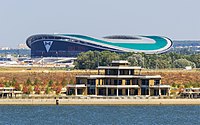 |  | ||
| Samara | Volgograd | ||
| Cosmos Arena (Samara Arena) | Volgograd Arena | ||
| Capacity: 44,918 (new stadium) | Capacity: 45,568 (rebuilt) | ||
 | 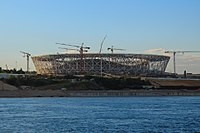 | ||
| Saransk | Rostov-on-Don | Sochi | Yekaterinburg |
| Mordovia Arena | Rostov Arena | Fisht Olympic Stadium (Fisht Stadium) | Central Stadium (Ekaterinburg Arena) |
| Capacity: 44,442 (new stadium) | Capacity: 45,000 (new stadium) | Capacity: 47,659 | Capacity: 35,696 |




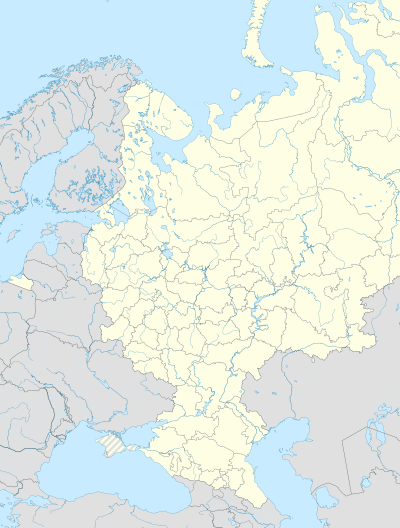


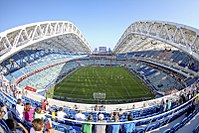
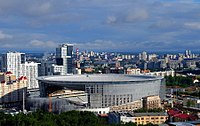
No comments:
Post a Comment